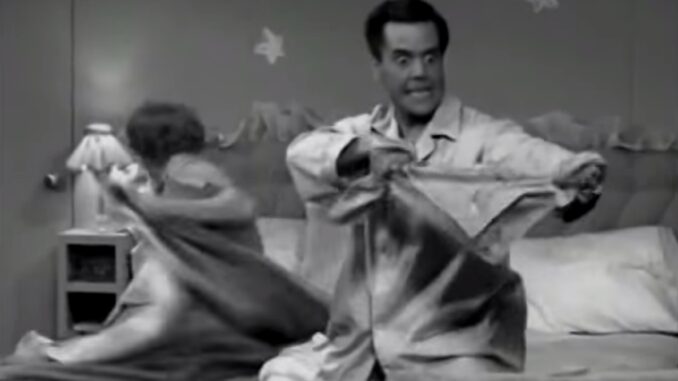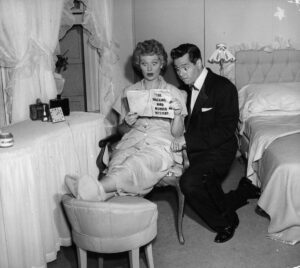
Unveiling Lucy Ricardo’s Alleged Dark Past
When you think of I Love Lucy, the first thing that comes to mind is probably Lucy’s hilarious antics and her knack for getting into mischief. But what if there’s more to Lucy Ricardo than meets the eye? A fan theory making rounds online suggests that behind Lucy’s bright smile and comedic timing, she may be hiding a dark and disturbing past.
Why This Theory Has Fans Talking
Fan theories often add layers to beloved characters, but this one has taken a particularly unsettling turn. It dives deep into Lucy’s quirks, behaviors, and even her marriage with Ricky Ricardo. Could her wild antics be more than just comedic genius? Let’s dig into the evidence.

The Seeds of a Troubled Past
Lucy’s Mysterious Backstory
Unlike other characters in sitcoms of the era, Lucy Ricardo’s pre-marriage life is shrouded in mystery. The show rarely delves into her past, and fans are left to fill in the gaps. This has led some to speculate that Lucy’s chaotic energy and constant scheming stem from a history of emotional trauma or unresolved issues.
Her Desperation for Stardom
Lucy’s unrelenting desire to break into showbiz is a central theme of I Love Lucy. But could this be a coping mechanism for a darker reality? Some fans theorize that Lucy’s obsession with fame hints at an earlier life where she faced neglect or failure, driving her to seek validation at any cost.
Analyzing Lucy’s Behavior Through a Psychological Lens
Impulsive Decisions and Risk-Taking
Throughout the series, Lucy’s impulsive decisions often land her in sticky situations. Whether it’s sneaking into Ricky’s shows or staging elaborate schemes, she rarely thinks about the consequences. Psychologists might interpret this as a sign of underlying emotional distress or a way to mask deeper insecurities.
Lucy’s Struggles With Authority
Lucy often clashes with Ricky, and their arguments frequently center around control and independence. Could these power struggles reflect unresolved issues from her past? Perhaps Lucy experienced a controlling or oppressive figure earlier in life, shaping her need to rebel and assert her autonomy.

Clues Hidden in Plain Sight
Recurring Themes of Deception
One recurring element in I Love Lucy is Lucy’s tendency to lie or hide things from Ricky. Fans have pointed out that this could hint at a past where honesty came with severe consequences. Her elaborate schemes might be a survival tactic she developed early on.
Her Relationship With Ethel
Lucy’s bond with her best friend, Ethel, is one of the most endearing parts of the show. However, some fans suggest that Lucy’s dependency on Ethel could indicate a fear of abandonment, possibly stemming from past experiences where she was left to fend for herself.
The Role of Ricky Ricardo
A Safe Haven or Another Source of Conflict?
While Ricky often serves as the voice of reason, their relationship isn’t without its issues. Some fans argue that Ricky represents a stabilizing force in Lucy’s life, providing the security she lacked in her past. Others believe that their frequent conflicts reflect deeper, unresolved emotional scars.
The Dynamic of Power and Control
Ricky’s authoritative demeanor and Lucy’s rebellious antics create a dynamic where Lucy constantly challenges traditional roles. This interplay could be a reflection of her struggle to reclaim control over her life.
The Influence of Post-War America
Cultural Expectations and Personal Freedom
The 1950s were a time of rigid societal norms, especially for women. Lucy’s character often pushes the boundaries of these expectations, which could be seen as a reflection of her internal battle between conforming and breaking free.
The Impact of World War II
Although the show doesn’t explicitly mention it, Lucy Ricardo’s fictional life would have been shaped by the events of World War II. Some fans speculate that Lucy’s past hardships might include war-related trauma, adding another layer to her character’s complexity.
Does This Theory Hold Water?
While there’s no concrete evidence to support this fan theory, it does offer a fascinating lens through which to view I Love Lucy. The show’s writers likely never intended for Lucy’s character to carry such a heavy backstory, but the ambiguity leaves room for interpretation.
Why We Love Speculating About Lucy
Fan theories like this one keep classic shows alive by inviting new ways of thinking about beloved characters. Whether or not Lucy Ricardo had a dark past, her antics and charm continue to captivate audiences decades later.
Conclusion
Lucy Ricardo is one of television’s most iconic characters, known for her comedic brilliance and endearing flaws. While the theory of her dark past adds an intriguing twist, it ultimately serves as a testament to the depth and complexity that fans bring to their favorite shows. Whether you see her as a troubled soul or just a lovable goofball, one thing’s for sure: Lucy Ricardo will always have a special place in our hearts.
FAQs
1. Did the creators of I Love Lucy ever address Lucy’s backstory?
No, the show’s creators intentionally kept Lucy Ricardo’s past vague to focus on the comedic aspects of her present life.
2. Why do fans come up with dark theories about lighthearted shows?
Fan theories often arise from a desire to explore deeper meanings and add layers to familiar characters, even in lighthearted shows.
3. Is there any evidence in the show supporting this theory?
While there’s no explicit evidence, fans point to Lucy’s behavior and certain recurring themes as potential clues.
4. How did Lucille Ball feel about Lucy Ricardo’s character?
Lucille Ball often described Lucy Ricardo as an exaggerated version of herself, focusing on comedy rather than realism.
5. Can fan theories change how we view classic shows?
Absolutely! They provide fresh perspectives and keep the conversation alive, allowing new generations to connect with timeless content.